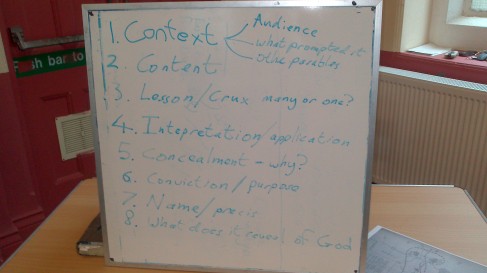Survey of the Bible 23. Perean Ministry 29-30 AD
Posted: June 24, 2013 Filed under: meetingnotes, New Testament, Survey of the Bible | Tags: hendriksen, Mike Johnson, new testament Leave a commentToday we sung ‘Have you heard the voice of Jesus’ before considering the scriptures relating to this period of Jesus ministry on earth. Perea is located just north and east of the Dead Sea, although one of the most significant events actually took place in Bethany, the other side of the Jordan, i.e. the raising of Lazarus.
We looked at the material relating to that period found in all four gospels: Matt 19:1-20:34; Mark 10; Luke 9:51-19:27; John 10:40-12:11
We noted that there was an example of the type of supposed contradiction that some who hate the Bible like to point out in comparing Matt20:20 v’s Mark 10:35 Who was it that asked for a place at Jesus side? James and John or their mother? The text allows for both to be true.
We observed that Mark 10 is very similar to Matthew 19, but mentioned 10:45, which reads: ’10v45 For even the Son of man came not to be ministered unto, but to minister, and to give his life a ransom for many.’ There was clear proof that the Saviour understood his purpose and linked with Old Testament prophesy, particularly Is 53.
Apart from that, the class considered the parables which Jesus gave at this time across in a significant number of the chapters of Luke especially. It seemed appropriate therefore to look at the parable as a form of discourse and how we can and should approach them when we read them in our Bibles. We came up with a series of eight items to help focus the mind when dealing with parables:
- Context (audience, what prompted it, other parables and how they relate to each other),
- Content
- Lesson/Crux – and are there many or one main point to the parable,
- Interpretation/application,
- Concealment – to what extent and why?,
- Conviction – i.e. purpose of the parable – one of which being to aid conviction of sin,
- Name/precis the parable – can help us get our mind around it,
- What does it reveal about God?
After applying this set of questions to Luke 14, we turned briefly to consider the doctrine of the Person of Christ from his conversation with Martha in John 11. The young man who asked Jesus, ‘Good Master, what good thing must I do to have eternal life?’ was certain that eternal life is earned through doing ‘good things’. When Jesus tells us, ‘I am the resurrection, and the life: he that believeth in me, though he were dead, yet shall he live:’, he is linking eternal life with himself. Ephesians 2:4-6 “But God, who is rich in mercy, for his great love wherewith he loved us, 5Even when we were dead in sins, hath quickened us together with Christ, (by grace ye are saved;) 6And hath raised us up together, and made us sit together in heavenly places in Christ Jesus:”
In the mystic union of Christ and his own his resurrection is our resurrection, his ‘quickening’ makes ours so certain that Paul can write as if it has already happened.
